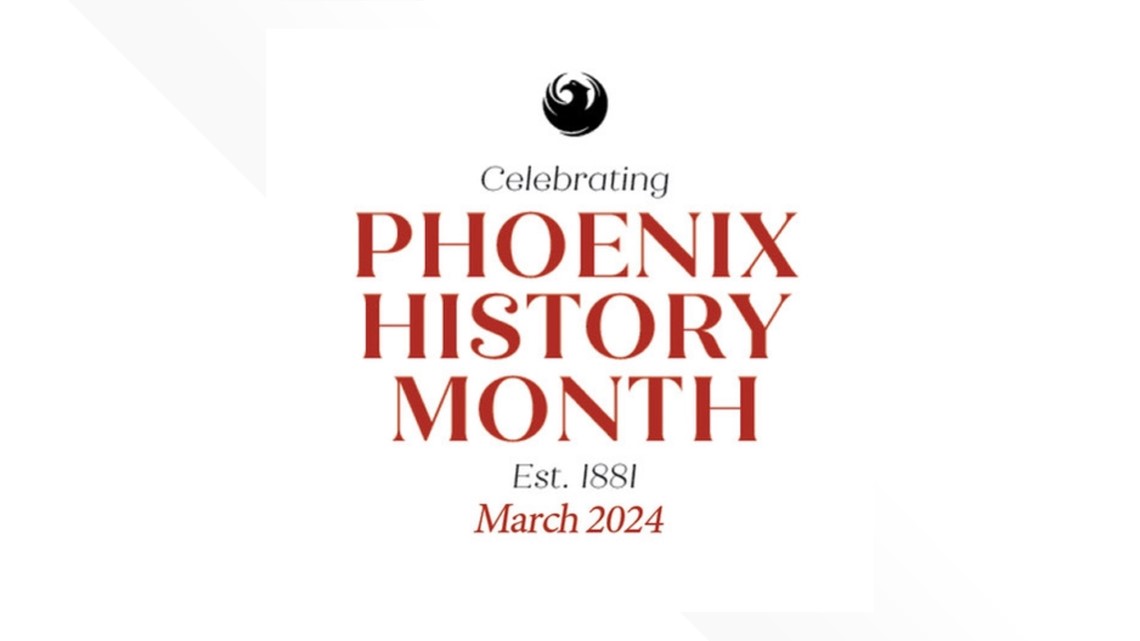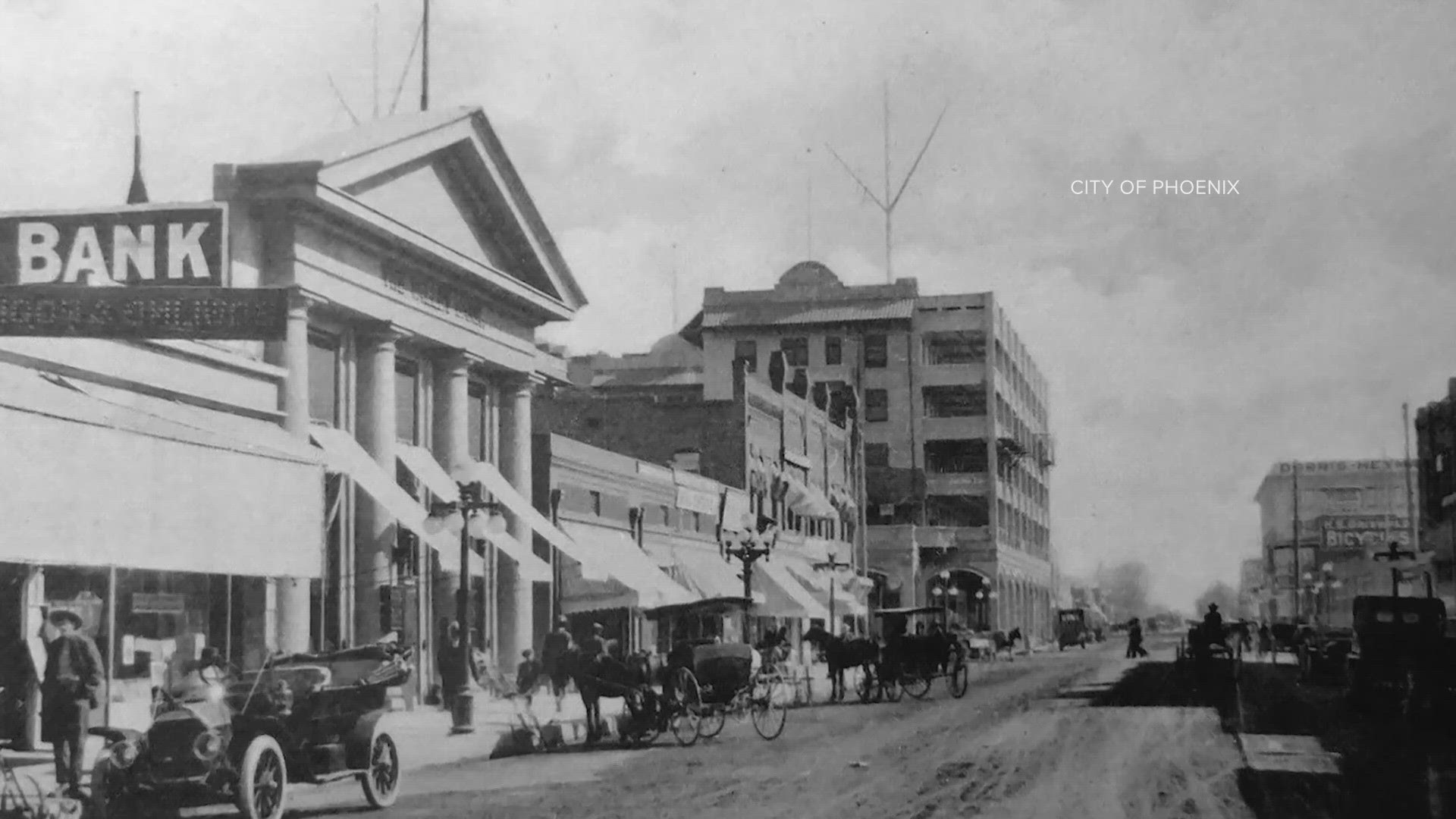PHOENIX — Phoenix, what a name for a city, huh? The mythical fire bird, rising from the ashes — seems perfect for a city built in the middle of the desert.
It also rolls off the tongue a lot easier than "Pumpkinville," doesn't it?
As strange and silly as it may sound, that name was one of several that American settlers considered for the city. There are lots of little quirks like that to Phoenix's history.
March is Phoenix History Month and to celebrate we sat down with Phoenix's official historian Steve Schumacher to get the scoop on some of these fun facts about our city's past.
The rise and fall of Pumpkinville
Okay, so it's not that dramatic. But early American settlers in the Valley went through a lot of names for the burgeoning city before "Phoenix" entered the conversation.
Jack Swilling, one of the men credited with founding Phoenix, was an ex-member of the Confederate army. He wanted to name the city Stonewall, after Confederate Army General Thomas "Stonewall" Jackson.
Another settler suggested the name Salina because of the nearby Salt River.
But the funniest by far was suggested for a simpler reason.
"Yeah, Pumpkinville, because there was all kinds of gourds and pumpkins around the area, that would be when they first started digging the canals," Schumacher explained.
A lot of wild pumpkins grew in the area, so they might as well call it Pumpkinville. Fortunately, there were better options on the table.
Phoenix was named by a British "Lord"
Eventually, the matter of the name came down to a group of 20 or so settlers. But it wasn't an American settler that brought up the winner — Phoenix.
"Well, the name was originally just brought up and proposed by a British Lord by the name of Darrell Duppa," Schumacher explained, "In most corners, he's credited with giving Phoenix its name."
"When you think about Phoenix, we are built today upon the ruins of the Hohokam indigenous community. If you know the mythology of the phoenix bird, the phoenix bird would die, it would burn and from the ashes a new phoenix would grow. And that's exactly what Darrell Duppa was proposing."
Born to English parents in Paris, France, Bryan Phillip Darrell Duppa claimed to be the black sheep son of a noble family. Although he was called Lord Duppa by his peers, it's hard to say for sure whether he was actual nobility.
Whatever the case, he's credited with naming Phoenix after the mythical bird, and Tempe after the Vale of Tempe in Greece. Better picks than Pumpkinville, in our opinion.
Phoenix's location was the least popular option
Early settlers didn't want to put Phoenix where it is today. In fact, the spot was pretty low on their list of choices.
"What we know as Phoenix today — typically Central, and Washington is what we think of with the core of downtown — that was actually the fourth choice," Schumacher said.
"Had the early pioneers been successful, what we know as Phoenix today would be where Tempe is."
Tempe's location was close to a shallow part of the Salt River, but massive limestone formations in the area made it difficult to build there with the explosives of the day.
"The second choice Jack Swilling and some of his group chose was right around 36th Street and Washington. Swilling actually built a huge house in hopes that the area would become Phoenix and the county seat and the capitol."
But... "It didn't work out that way," Schumacher said.
The settlers continued moving down to where St. Luke's Hospital now stands. When that area didn't quite stick, the farmers in the area got together to hold a vote on where the city should be.
"They chose the area that we know as downtown Phoenix today."
The fourth time was the charm, and the location stuck.
Phoenix's roads were named after Native tribes
Streets to the east, avenues to the west: that's how most residents know to navigate the numbered grid of Phoenix's roads. But in the city's early days, those numbered roads were (mostly) named after Native tribes in the area.
Some of the names used for the young city's north-south streets were Apache, Arivapai, Cocopah, Hualapai, Maricopa, Mojave, Papago, Pima, Pinal, Tonto, Yavapai and Yuma.
1st Avenue was named Cortez and 1st Street was named Montezuma, but neither of those are tribes. Additionally, "Arivapai" is a misspelling and the actual tribe name is spelled Aravapi.
There was one more exception, "Centre." Now called Central Avenue, the spelling may have changed but the overall name is the same. So where did the Native names go?
"About 1893, Phoenix had become an incorporated city and was growing and growing," Schumacher explained. "People were complaining that they couldn't remember the street names of Indian tribes. So they changed to numbers people could remember."
After World War II, Phoenix grew by about 400% and only continued to expand. Now, we have numbered streets and avenues that go into the hundreds and about 1,625,000 people living here.
Phoenix has come a long way from Pumpkinville.
>> Download the 12News app for the latest local breaking news straight to your phone.


WE ❤ ARIZONA
Explore amAZing people, places and things across our state on our 12News YouTube playlist here.
Watch 12News+ for free
You can now watch 12News content anytime, anywhere thanks to the 12News+ app!
The free 12News+ app from 12News lets users stream live events — including daily newscasts like "Today in AZ" and "12 News" and our daily lifestyle program, "Arizona Midday"—on Roku and Amazon Fire TV.
12News+ showcases live video throughout the day for breaking news, local news, weather and even an occasional moment of Zen showcasing breathtaking sights from across Arizona.
Users can also watch on-demand videos of top stories, local politics, I-Team investigations, Arizona-specific features and vintage videos from the 12News archives.
Roku: Add the channel from the Roku store or by searching for "12 News KPNX."
Amazon Fire TV: Search for "12 News KPNX" to find the free 12News+ app to add to your account, or have the 12News+ app delivered directly to your Amazon Fire TV through Amazon.com or the Amazon app.

